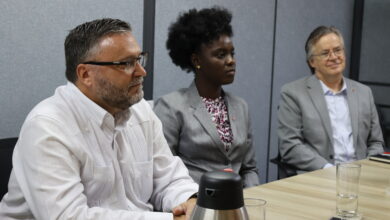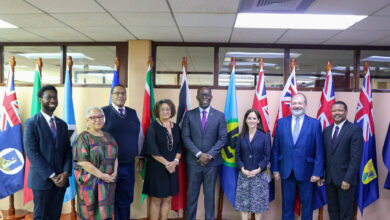As the Region celebrates World Environment Day 2015, the CARICOM Secretariat is conscious of issues related to the environment and agriculture, particularly sustaining the environment to ensure food and nutrition security for this and future generations. In the accompanying video, Deputy Programme Manager, Agricultural Development, Dr. Ronnie Brathwaite, addresses some of the issues related the environment and agriculture on this occasion.
orld Environment Day (WED) is the day designated by the United Nations to encourage international awareness and action for the environment. It is celebrated on June 5th annually with a different issue being highlighted each year. This year’s theme is ‘Seven Billion Dreams. One Planet. Consume with Care’.
The theme advances the position that the well-being of humanity, the environment, and the functioning of the economy, depends upon the responsible management of the planet’s natural resources. The statistics overwhelmingly show that people are consuming far more natural resources than what the planet can sustainably provide over time.
Scientists estimate that by 2050, if current consumption and production patterns persist, with a rising population expected to reach 9.6 billion, we will need three planets to sustain our ways of living and consumption. It is therefore imperative that our people begin to learn how to live within planetary boundaries or in other words, do “more and better with less”.
For the CARCIOM Secretariat Celebration of WED, focus will be placed on two issues. Firstly the issue offood and nutrition security is critical to this Region especially as it relates to managing our food import bills, securing the livelihoods of the farming and fishing sectors and ensuring proper nutrition for our citizens.
Dr. Ronnie Brathwaite, CARICOM Deputy Programme Manager, Agricultural Development, on World Environment Day from Caribbean Community on Vimeo.
This World Environment Day celebration seeks to raise awareness about the impact of individuals on the environment through their dietary choices and habits, as well as the impacts on lifestyles of poor consumption choices. The figures provided by the United Nations indicate that over-consumption of food is detrimental to both health and the environment. This is seen in the facts that 1.5 billion people globally are overweight or obese and the food sector accounts for around 30 per cent of the world’s total energy consumption and approximately 22 per cent of total Greenhouse Gas emissions.
Research has also shown that increased consumption adversely affects food security by increasing food prices while upsurges in production of more resource-intensive food products deplete the agro-ecological resource base, affecting its ability to produce plentiful food.
The second issue of major concern for the CARICOM Region is that of waste management. Rapid urbanisation and economic development has resulted in changing resource consumption patterns within the Region, leading to increases in the volumes of waste produced as well as in the types of waste produced.
Added to that is the increasing industrial waste generation rates which, in CARICOM, are often produced by industries run by small- and medium-size enterprises (SMEs) which lack the resources, technologies and capacities to integrate recycling and resource efficiency into the production process.
The changing composition of waste is also of concern as the Region grapples with new hazardous and special waste streams e.g. e-waste, health care waste and hazardous chemicals.

Photo: Part of the CARICOM Secretariat display for World Environment Day 2015
For the Region, improved waste management can produce significant benefits including reducing health and environmental problems, reducing greenhouse gas emissions (especially from landfills), preserving scenic landscapes and reducing water and air pollution and littering.
In recognition of these concerns and to raise awareness among the staff, the CARICOM Secretariat celebrates World Environment Day 2015 by mounting a display of educational materials; inviting all members of staff to share their vision for the Caribbean Environment by 2030 on display boards provided for this purpose; and inviting members of staff to make pledges as to what action they will take in their personal lives to help achieve their vision.







